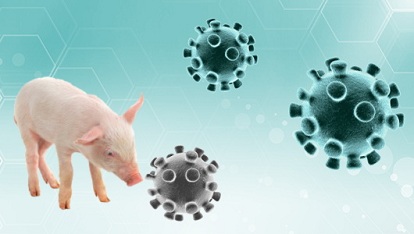Coronavirus News: University Of North Carolina Uncovers Shocking Evidence Of Human Susceptibility To New Emerging Swine Coronavirus Strain SADS-CoV
Source: Coronavirus News Oct 13, 2020 4 years, 6 months, 1 week, 6 days, 8 hours, 10 minutes ago
Coronavirus Latest: Scientist from the University of North Carolina (UNC) Gillings School of Global Public Health have in a study uncovered alarming evidence that humans are susceptible to the new emerging swine coronavirus that has recently been alarming the swine industry.

The new study from the Baric Lab at UNC warns that the coronavirus strain, known as swine acute diarrhea syndrome coronavirus (SADS-CoV), that emerged from bats and has been infecting swine herds throughout China since it was first discovered in 2016. The new evidence confirms that the strain already has the potential to spread to humans as well.
The study team said, “The emergence of new human and animal coronaviruses demand novel strategies that characterize the threat potential of newly discovered zoonotic strains. In the study, we synthetically recovered recombinant wild-type and derivative swine acute diarrhea syndrome coronaviruses (SADS-CoVs) that express indicator genes and characterized their growth, macromolecular biosynthesis, and replication efficiency in a variety of mammalian cell lines, including primary human cells. The data demonstrate that SADS-CoV has a broad host range and has inherent potential to disseminate between animal and human hosts, perhaps using swine as an intermediate species.”
The study findings were published in the peer reviewed journal: PLOS
https://www.pnas.org/content/early/2020/10/06/2001046117
Past reports have emerged that in 2019 and 2020 the incidence of such swine coronavirus breakouts in China have erupted on numerous occasions but the Chinese Government has been concealing the issue.
https://www.ncbi.nlm.nih.gov/pmc/articles/PMC7229464/
The SADS-CoV coronavirus causes severe diarrhea and vomiting and has been especially deadly to young piglets. Outbreaks of such an illness have the potential to wreak economic havoc in many countries across the world that rely on the pork industry.
Although the virus belongs to the same family of viruses as the betacoronavirus SARS-CoV-2, which causes the respiratory illness COVID-19 in humans, SADS-CoV is an alphacoronavirus that causes gastrointestinal illness in swine. SADS-COV is also distinct from two circulating common cold alphacoronaviruses in humans, HCoV-229E and HCoV-NL63.
SADS-CoV has not been known to affect humans to-date however some Chinese media in the past have reported of pork farmers dying from a strange infection in China and again the Chinese authorities could be concealing such incidences.
The COVID-19 pandemic serves as a potent reminder that many coronavirus strains found in animals have the potential to infect humans as well an effect known as spillover.
Prominent virologist Dr Ralph Baric, Ph.D., William R. Kenan, Jr. Distinguished Professor of epidemiology at the Gillings School at UNC told Thailand Medical News, "
While many investigators focus on the emergent potential of the betacoronaviruses like SARS and MERS, actually the alphacoronaviruses may prove equally prominent if not greater concerns to human health, given their potential to rapid
ly jump between species."
Master of Public Health student and research specialist Dr Caitlin Edwards, is first author on a study that suggest humans may be susceptible to spillover of SADS-CoV. Working with a team in the Baric Lab, Dr Edwards tested several types of cells by infecting them with a synthetic form of SADS-CoV in order to understand just how high the risk of cross-species contamination could be.
Alarmingly evidence from the study indicates that a wide range of mammalian cells, including primary human lung and intestinal cells, are susceptible to infection.
According to Dr Edwards,
SADS-CoV shows a higher rate of growth in enteric cells found in the human gut, unlike SARS-CoV-2, which primarily infects lung cells.
Significantly cross-protective herd immunity often prevents humans from contracting many coronaviruses found in animals. However, results from the testing done by Dr Edwards and her team suggest that humans have not yet developed such immunity to SADS-CoV.
Dr Edwards explained, "SADS-CoV is derived from bat coronaviruses called HKU2, which is a heterogenous group of viruses with a worldwide distribution. It is impossible to predict if this virus, or a closely related HKU2 bat strain, could emerge and infect human populations. However, the broad host range of SADS-CoV, coupled with an ability to replicate in primary human lung and enteric cells, demonstrates potential risk for future emergence events in human and animal populations."
Dr Edwards warned, "We recommend that both swine workers and the swine population be continually monitored for indications of SADS-CoV infections to prevent outbreaks and massive economic losses."
The SADS-CoV coronavirus could also pose a threat to the U.S. economy, which was third in global pork production in 2019. In 2012, the U.S. pork industry was devastated by different swine coronavirus that emerged from China.
Dr Baric added, "Not surprisingly, we are currently looking for partners to investigate the potential of SADS-CoV vaccine candidates to protect swine."
He added, "While surveillance and early separation of infected piglets from sows provide an opportunity to mitigate larger outbreaks and the potential for spillover into humans, vaccines may be key for limiting global spread and human emergence events in the future."
The study warned,” SADS-CoV also has a broad host range and replicates efficiently in primary human lung and intestinal cells. Due to the variability in infection efficiency seen between various donors of human primary cells,
it is likely that in the case of a spillover, we would see a range of SADS-CoV severity in human patients. Swine are known amplifying hosts for several human pathogens, providing an infrastructure for the possibility of future emergence events.”
For more
Coronavirus News, keep on logging to Thailand Medical news.
